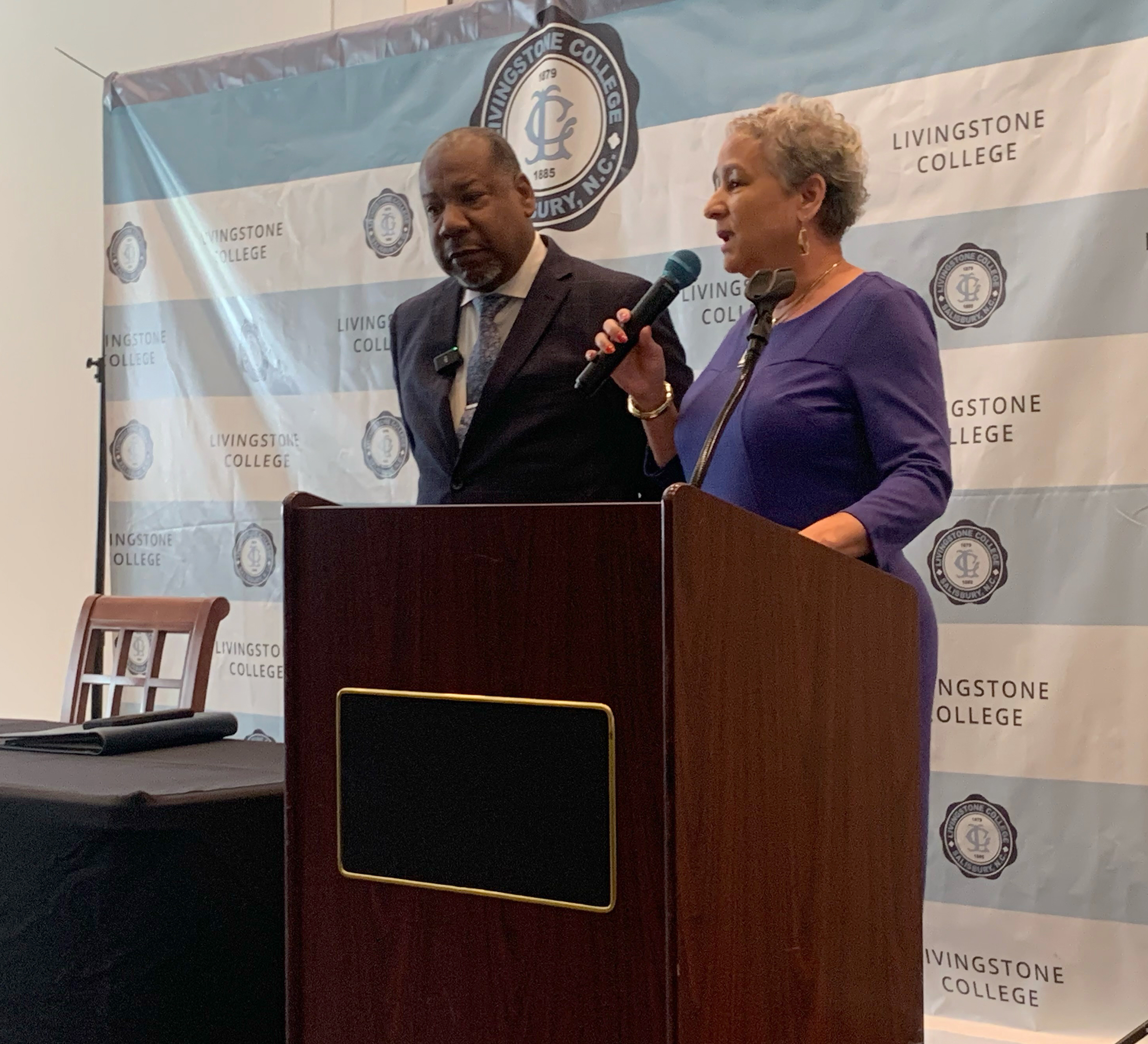Shelter, support, stability and a sanctuary: Livingstone College partnership directs resources to foster care kids
Published 12:07 am Tuesday, May 2, 2023

- Livingstone College President Dr. Anthony Davis, left, joins Home4Me founder and executive director Donna Reed during an announcement on campus Monday. - Chandler Inions
SALISBURY — A new partnership between Livingstone College and Home4Me, a Charlotte-based non-profit, aims to attract college students who were once in the foster care system.
The move was officially announced on Monday in conjunction with National Foster Care Month. According to Livingstone College President Dr. Anthony Davis, they anticipate anywhere from 15-20 students in the inaugural class, which they hope to have up and running by the fall semester.
The partnership pairs Home4Me, which provides wrap-around services for those who age out of the foster care system.
“(HOME) stands for hope, opportunity, mentoring and education,” said Rev. Donna Reed, the Home4Me founder and executive director. “We guide young people through their teenage years until their college experience. We become that consistency, that family that they are lacking and that support system so they don’t have to worry about the journey of who is going be there for them and who is going to be there for them when they age out, which is one of the greatest causes of their mental anguish in the system and when they are aging out of the system.”
Much like Davis, Reed was also a foster child. Both were raised by non-biological parents in Connecticut.
“Little to less is being done now than when I started out,” Reed said. “Now, we are making sure that the young people have what they need. Twenty-three thousand age out of foster care every year without a family, and 20 percent will be instantly homeless on their 18th birthday.”
Reed and Davis met through the college’s BRIDGE program, designed to assist high-school graduates who underachieved during their high school careers but still may have the capabilities and drive to excel academically, socially and spiritually if given the proper guidance and support. The BRIDGE Program aims to increase provisionally admitted students’ persistence, retention and graduation rates through an intense six-week summer experience before their fall enrollment, followed by an ongoing academic year program throughout their matriculation.
According to Reed, studies have shown that while many foster care children desire to attend college, few are able to make it a reality.
“Less than 3 percent go and graduate, and that is because when they go to college, they lack support, guidance, funding and housing,” Reed said. “With our partnership with Livingstone College, they will have all of that through the wrap-around services that we will be providing.”
With the right guidance, Davis believes that foster care children can still have a chance to be successful and to defy the odds that are stacked against them.
“Foster care awareness is a forgotten discussion,” Davis said. “More than 400,000 children experience foster care in the United States each year. Most of them are going to be Black and brown. The statistics are challenging. Seven out of 10 women who age out of foster care become pregnant before the age of 21. Sixty percent of males who age out are convicted of a crime. One out of two will be substance dependent. One out of four will never graduate high school.”
Despite the overwhelming obstacles, Davis envisions a system that can nurture those children and help them grow into successful adults.
“The tragedy is this trajectory can be changed when there is an intentional collision between concern, compassion and conviction,” Davis said. “That is why we are gathered here today.
“We will begin the work that is necessary where we will have a center for aging out on the campus of Livingstone College,” Davis said. “This center will do more than just admit young men and women into college. It will provide the necessary resources that will render matriculation successful.”
Davis pointed out that many might ask why those students don’t go to community college.
“When you go to community college, there is no housing department,” Davis said. “When you go to community college, you are thrust into classrooms with adult learners, and they may not have some of the support services or the wrap-around services that are necessary.”
According to Davis, those resources are four-pronged and pivotal to his success.
“Shelter, support, sanctuary and stability,” Davis said.


